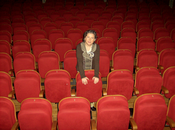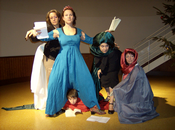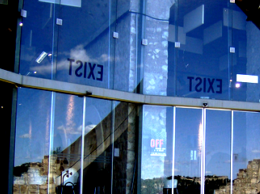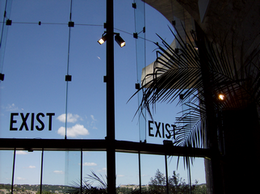Link with
Euro-Mediterranean
EMBARKATION MATTERS questions to Céline Garcia
What is a dramatic arts training? Are you the teacher?
Céline Garcia :
I am an artist-teacher, fond of theatre and pedagogy. I even created a website in order to try to answer to those fundamental questions you ask, to spread some precisions about my job, which is often considered as unconventional and badly known.
The great artists that trained me were also all great teachers, and that certainly influenced my professional choice. When you are a theatre teacher, you have to agree totally with your discourse, and that is extremely risked since you expose yourself totally. This calls for unlimited energy and authenticity. This is an extremely demanding work.
Concerning the School of Dramatic Arts, for which I am jointly responsible with the director –who himself manages the three sectors Music, Dance and Dramatic Arts- it is an up to date school, which makes a link between territories, artistic disciplines, repertoires, times.
The degree course is compatible with school and the professional life if you are serious or if you adjust your schedule.
Does it mean that there are exams, tests, assessments?
They are necessary events, fascinating moments, and challenges. For instance, the end-of-term report with all its headings is a real photography of the theatre degree course, the assessment and the progress are measurable, and thus I can provide a pedagogical and artistic supervision.
How do you assess?
The assessment takes many things into account: the regularity, the progress, the participation, and the public representation. Thus, in order to remain unbiased among the profusion of styles in theatre, the disciplines are classified and categorized:
- Classical works and performance
- Contemporary works and performance
- Poetical drafts
- Improvisation and links with music, dance, objects and new technologies

Are those disciplines studied during the year?
Those four main working lines interpenetrate since theatre teaching is complicated. Knowledge, techniques, and methods are numerous and theatre has also a global nature that could be reduced if we fragmented it too much. Thus we chose to gather everything in order to lead young pupils to consider theatre as the Art of a dramatic whole: theatre or dramatic arts, art of complex action.
For instance, we will study the Commedia dell’arte by studying the performance with a text of Molière, and we can also choose to study the performance for one character or another by working on clowns. For instance, one pupil prepares himself for going on stage with a special exercise: “on the desk”, with readings and adapted warms-up exercises.
However, we do not put those different techniques and steps or stages into rubrics. It is because they are studied among the rest of the learning and in the heart of the performance that makes sense and order.
The classical and contemporary works are a whole and a substance.
The texts of the classical works are not historically limited to the classical period of the 17th century even though it is what young pupils learn. The “classical” works contains all the old writings
We distinguish them from the texts belonging to the contemporary works. We make people sensitive to the up to date texts.
We make the different works meet; we make them “rub” with each other. We do not consider it as a choice between classical and contemporary theatre. During the learning, pupils study both works in the same time, and are confronted with the language, the languages as a fundamental stage matter.
We also encourage young people to perform in a foreign language, which is considered as a natural theatre exercise.
Poetical drafts

Here, for instance, the language matter is in the heart of the draft. No character and no initial situation. The actor must build a whole universe on his own. This is maybe this “lesson of loneliness” about which Daniel Mesguish (director of the Conservatoire National Supérieur de Paris) talks. The actor, alone on the stage, must dig into his own depth, into his personal poetry. It is an occasion for interesting discoveries.
When you say draft, you also say concrete and construction, progressive working-out where conception and realization gather into a poetic text theatrically studied. It is an occasion to penetrate the universes of great poets, to become aware that great playwrights are great poets, and also to create a theatrical existence and shape with something that poetically vanishes. It is a very formative moment to revise the fundamentals of theatre.
Improvisation and link with music, dance, objects, visual arts, new technologies
We give rise to theatre from all those elements and after all, from something else than theatre. We look for other entrances. We do that alone or among others. It can also be from texts which are not considered as theatrical texts (we write a diary or we read a paper…) and it is enough to stand on the stage.
The word “improvisation” does not content any idea of match or league. Just, we link each other, we connect ourselves to the world immediately, spontaneously, being a sort of searching guild with him and with the only means we then have at our disposal. This whole matter of being present to the sensitive world is here, just like the matters of the invisible things and of the craft fair nature of theatre.
Will I express myself there ?
Concerning the valuation of the artistic expression, we also chose to gather strong points around some main lines: diction, voice, movement, sensitivity, imaginary universe
that lead so many other marker notions like: look, strength, fragility, virtuosity, boldness, simplicity, instinct…
Into this bringing together, there is as much technique as soul. Jouvet said: “The diction is the character’s soul”.
What does the casting consist in? Is it accessible for novices?
With the agreement of the teacher the pupils can occasionally give a performance in another context than the specific context of the performing arts, but only if it has a pedagogical, theatrical and transmission significance, and if it feasible, for instance during the prize winners’ show or the presentation of the pedagogical and artistic season of the School or public lessons that occasionally show the teaching which often remains confidential.
Actor work
Those are little shapes, geometrically variable, researches and experiments under the responsibility of Céline Garcia, that actors students present to the audience every year and that contribute to make the audience sensitive to theatre. We are talking about open, sequential shapes, temporarily finished, that “accept their own incompleteness” like Pierre Boulez said about a musical exhibition at the Louvre in 2008. Those creations sensitively deal with the problem of theatrical writing.
They enable pupils to “approach” theatre, to be in contact with theatrical practice in its multiplicity: space of the stage, stage design, production, body of the actor, text, sound, visual effects… In compliance with intellectual and artistic legal obligations, the use of the whole or a part of this work without the authorization of the manager and the structure of the creation is forbidden.
The auditions and the performances are moments of expertise put on display, moments of confrontation to the audiences, and let us not forget that those actors participate to the cultural training of those audiences.
However, it is important never to forget the powerful existence of theatre separated from the shows since “School is the greatest theatre in the world. School has neither a beginning nor an end. There, no one foresees the destiny of people” Antoine Vitez said.
End-of-year Exams
Their contents follow the main learning lines with productions of excerpts of:
Classical theatre, contemporary theatre, poetical drafts, songs, readings on the stage…
Every academic cycle contains suited tests.
The students in the 3 cycles follow a fitted training during the year with a presentation and a preparation to the exams a few weeks before the exams.
3 credits for classical theatre, contemporary theatre, poetical drafts and improvisation are compulsory in order to obtain the CET with the mark magna cum laude for at least one of them. Classical and contemporary theatre are 2 indissociable credits.
Why do you often use the word EXERCISE ?
First of all, for me, this is not a humble word. It is a very strong word. In a time where AMATEUR THEATRE is in the heart of many reflections, after all with the exercise, I offer an invigorating speech, working away at theatrical actions, here, now, in a practice improved by my multiform experiences (academy, company, university, school, association, and firm). The practice of theatre with exercises goes far beyond any compartmentation and sectional borders. When I direct an actor, I do not care if he has been or will be professional or not. I want him to search further than where he is and to create into himself a movement that will help him to meet the text, the character and also to understand my demands.
Theatre is deeply emancipator in that eternal movement between far from the world and next to the world, between our time and out of time, between on the stage and out of the visual field… The transmission of those ideas to young people seems to me to be a promising guarantee of citizenship. Theatre starts with exercises. Research and experiments are more important than the show which is only an outcome.
The meeting I talked about in response of your first question is maybe the most important exercise.
« Theatre is not a simple recreation, or a luxury object, it is an urgent need for every man and every woman.” » Jean Vilar said.
So, how do you do to produce this meeting or this exercise ?

How can someone call theatre and make him answer ? From what can we produce him ?
In a purified space, (which does not mean dry) with or without a stage, but appropriate to gather people in order to share, empty and wide space with spotlights for a focus on the performance area.
Remember in the same time the demands of theatre and the importance of the freshness in the artistic universe.
To meet classical writings, and contemporary texts, to read, to read aloud, to read on the stage and to shift the reading until the text and every theatrical things that do not belong to the text find their place on the stage.
